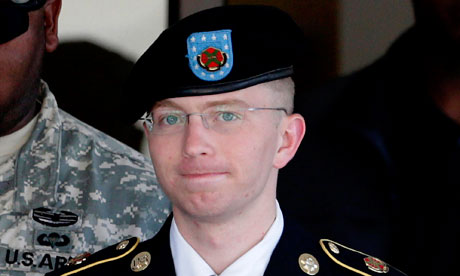 Bradley Manning, the Army intelligence analyst who laid bare America's wars in Iraq and Afghanistan by covertly transmitting a massive trove of sensitive government documents to WikiLeaks, has been convicted on 19 of 21 charges, including 5 counts of espionage. He was found not guilty of aiding the enemy, the most serious and controversial charge laid against him.
Bradley Manning, the Army intelligence analyst who laid bare America's wars in Iraq and Afghanistan by covertly transmitting a massive trove of sensitive government documents to WikiLeaks, has been convicted on 19 of 21 charges, including 5 counts of espionage. He was found not guilty of aiding the enemy, the most serious and controversial charge laid against him.
After warning a courtroom packed with 30 spectators, almost all of them Manning supporters, that she would accept no disruptions, the judge overseeing his military court martial, Col. Denise Lind, rapidly delivered her verdict in a crisp voice.
For journalists watching the proceedings from a remote media room, there was no time to gauge Manning's reaction before the military cut off a live feed from the courtroom.
The prosecution's novel legal theory that Manning knew his disclosures to WikiLeaks, once published on the internet, would wind up in al Qaeda's possession could have had implications that extended beyond the fate of the 25-year-old Crescent, Okla., native.





 Francisco Galicia paced his cell at Fort Hunter Liggett, a vast army base 160 miles south...
Francisco Galicia paced his cell at Fort Hunter Liggett, a vast army base 160 miles south... The U.S. Coast Guard launched an internal investigation after a swastika was found on a bathroom...
The U.S. Coast Guard launched an internal investigation after a swastika was found on a bathroom... The US military launched a strike on an alleged drug smuggling boat in the eastern Pacific...
The US military launched a strike on an alleged drug smuggling boat in the eastern Pacific...






























